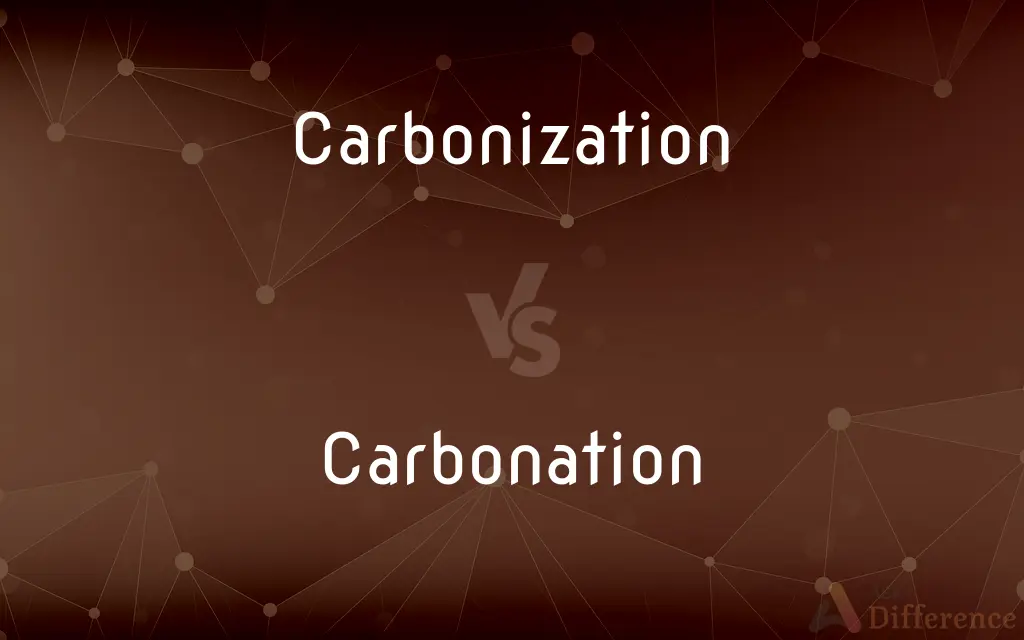Carbonization vs. Carbonation — What's the Difference?
By Maham Liaqat & Fiza Rafique — Updated on March 2, 2024
Carbonization is the process of converting organic material into carbon through decomposition at high temperatures, while carbonation refers to the dissolution of carbon dioxide in a liquid, often seen in carbonated beverages.

Difference Between Carbonization and Carbonation
Table of Contents
ADVERTISEMENT
Key Differences
Carbonization and carbonation are two distinct processes involving carbon but differ significantly in their methods, outcomes, and applications.
Carbonization is a thermal decomposition process that occurs under high temperatures in the absence of oxygen, transforming organic materials into carbon or carbon-rich residues. This process is crucial in the formation of coal from plant material over millions of years, as well as in the production of charcoal, carbon fibers, and other carbon-based materials. Carbonization involves breaking down the molecular structure of the organic material, driving off volatile compounds, and leaving behind a solid carbon structure. This process is widely used in various industrial applications, including fuel production, carbon composite manufacturing, and even in the preparation of activated carbon for filtration.
Carbonation, on the other hand, involves the chemical reaction between carbon dioxide (CO2) and water (H2O), forming carbonic acid (H2CO3). This process is most commonly associated with the production of carbonated beverages, where CO2 is dissolved under pressure into a liquid, giving it a fizzy texture. Carbonation can also refer to a natural geological process where rock minerals react with carbonic acid, leading to the formation of carbonate minerals. In the context of environmental science, carbonation is a significant aspect of the carbon cycle, contributing to the natural sequestration of CO2.
The primary difference between the two processes lies in their nature and applications: carbonization is a thermal process used to convert organic material into carbon, while carbonation is a chemical reaction involving the dissolution of CO2 in a liquid or the reaction of CO2 with minerals. Carbonization is used in energy production and material science, whereas carbonation is crucial in beverage production and plays a role in environmental carbon capture and storage.
Comparison Chart
Process
Thermal decomposition of organic materials in the absence of oxygen.
Dissolution of carbon dioxide in liquid, forming carbonic acid.
ADVERTISEMENT
Outcome
Solid carbon or carbon-rich residues.
Carbonated liquid or carbonate minerals.
Applications
Coal formation, charcoal production, carbon fibers, activated carbon.
Carbonated beverages, geological carbon sequestration, environmental science.
Conditions
High temperatures, absence of oxygen.
Pressure to dissolve CO2, presence of water or minerals.
Relevance
Industrial and material science for energy and filtration.
Beverage industry, geological processes, environmental carbon cycle.
Compare with Definitions
Carbonization
Essential in coal formation from ancient plant material over geological times.
Coal deposits are the result of the carbonization of prehistoric vegetation.
Carbonation
The process of dissolving CO2 in liquids to create fizzy drinks.
Carbonation of water is the basic step in making soda.
Carbonization
Involves the removal of volatile substances, leaving a carbon skeleton.
Carbonization in an oxygen-free environment prevents combustion and preserves carbon.
Carbonation
Enhances the texture and taste of beverages, making them effervescent.
The carbonation process gives beer its characteristic bubbles.
Carbonization
Used in the production of carbon fibers for lightweight, strong materials.
Carbon fibers are made through the controlled carbonization of polyacrylonitrile.
Carbonation
Naturally occurs in water to form carbonic acid, mildly acidic.
Rainwater undergoes carbonation, absorbing CO2 from the atmosphere.
Carbonization
A process that transforms organic materials into carbon through high-temperature decomposition.
The carbonization of wood produces charcoal.
Carbonation
Contributes to the weathering of rocks through reaction with minerals.
Limestone caves form due to the carbonation of calcium carbonate.
Carbonization
Applied in creating activated carbon for filtering and purification.
Activated carbon is produced by carbonizing coconut shells at high temperatures.
Carbonation
Used in environmental science for carbon capture and storage.
Mineral carbonation traps CO2 in stable carbonate minerals.
Carbonization
The process of carbonizing.
Carbonation
Carbonation is the chemical reaction of carbon dioxide to give carbonates, bicarbonates, and carbonic acid. In chemistry, the term is sometimes used in place of carboxylation, which refers to the formation of carboxylic acids.
Carbonization
The destructive distillation of bituminous coal, done in the absence of air in order to obtain coke and other fractions having a greater percentage of carbon than the original material.
Carbonation
To add carbon dioxide gas to (a beverage) so that bubbles are produced upon release from a container.
Carbonization
The act or process of carbonizing.
Carbonation
The state of having carbon dioxide gas dissolved in a liquid. Category:en:Carbon
Soda pop is basically sugar water with a little bit of flavoring and added carbonation.
Carbonation
The amount or level of dissolved carbon dioxide remaining in solution.
Celia didn't eat at the diner anymore because she thought the carbonation in their fountain drinks was off.
Common Curiosities
What is the purpose of carbonization in industrial applications?
Carbonization is used to produce energy sources like coal and charcoal, manufacture carbon fibers for various applications, and create activated carbon for filtration and purification.
Is carbonation harmful to the environment?
Carbonation itself is not harmful and can be part of natural processes that help sequester CO2. However, the industrial release of CO2 without adequate sequestration can contribute to climate change.
Can carbonization occur at room temperature?
No, carbonization requires high temperatures to decompose organic material into carbon, far above room temperature.
Does carbonization have any environmental benefits?
When used for creating activated carbon, carbonization can have environmental benefits by producing materials that help in filtering and purifying water and air, reducing pollutants.
Are there any safety concerns with carbonation?
Proper safety measures are important in industrial carbonation processes to handle high-pressure CO2 safely, but carbonated beverages are generally safe for consumption.
How is carbonation controlled in the production of carbonated beverages?
In beverage production, carbonation is controlled by dissolving CO2 under pressure in the liquid until the desired level of carbonation is achieved.
How does carbonation affect the taste of beverages?
Carbonation adds a fizzy texture and a slightly acidic taste to beverages, enhancing their refreshment quality and overall sensory experience.
What materials can undergo carbonization?
Any organic material containing carbon can undergo carbonization, including wood, plant matter, and certain polymers.
What happens to the carbon dioxide in carbonated beverages when opened?
When a carbonated beverage is opened, the pressure is released, allowing the dissolved CO2 to escape, resulting in the bubbles and fizz.
How does carbonation contribute to rock weathering?
Carbonation contributes to rock weathering by dissolving minerals in rocks through the formation of carbonic acid, leading to the gradual breakdown and formation of new minerals, such as in the creation of limestone caves.
Share Your Discovery

Previous Comparison
Quarrel vs. Row
Next Comparison
Pubescent vs. AdolescentAuthor Spotlight
Written by
Maham LiaqatCo-written by
Fiza RafiqueFiza Rafique is a skilled content writer at AskDifference.com, where she meticulously refines and enhances written pieces. Drawing from her vast editorial expertise, Fiza ensures clarity, accuracy, and precision in every article. Passionate about language, she continually seeks to elevate the quality of content for readers worldwide.
















































